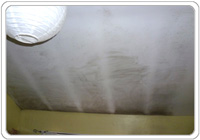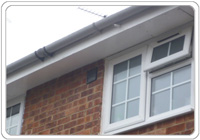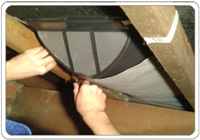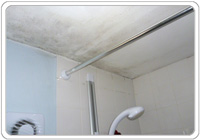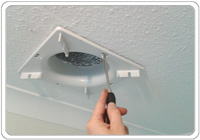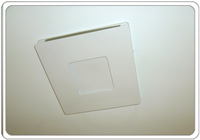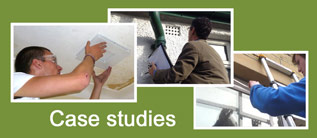
Case study: A detached house in Leeds with mould problems
The problem
A modern 4-bed detached property occupied by a family of five that suffered from extensive mould in all the rooms on the first floor with some mould present on the ground floor.
Our assessment
A significant factor in assessing why a home has air quality and mould issues is understanding the way the home is used. Washing, cooking, breathing etc. all contribute to an estimated two pints of humidity per person per day being released into our homes. In this case, two adults and three children will generate much more humidity than say a retired couple living in the same house.
In this house there were a number of factors which when combined together produced a problem. The house felt humid, and Relative Humidity readings were in the 60-70% range - too high and a recipe for condensation and mould.
The cavity walls and the loft were insulated. The windows were relatively modern and draught proof, There was a bathroom fan but it was not very effective. The roof underlay was of a non-breathable bitumen type but there were no ventilation grilles in the soffits - and so the loft felt air-tight. A number of the bedroom doors were poorly fitted and 'tight' to the carpet.
Our solution
Our approach in this property was to improve the insulation where possible and introduce managed fresh air.
Where there is little air circulating in the loft this almost always adds to the general humidity in the house. If we find a home with poor loft ventilation we will always recommend resolving the problem.
In this case we fitted internal roof vents, we also trimmed the bottom off several doors to create the recommended 10mm gap. Small measures like this can help air to circulate in problem rooms like bedrooms.
Now that the loft was well ventilated we fitted a positive input ventilation system to bring fresh air into the house.
As the family had young children who used the bath frequently we fitted an improved extract fan with trickle function to take the humidity out of the bathroom prevent it from moving into the rest of the house. This works in tandem with the positive input ventilation system to provide a low level movement of background air.
See our page on solutions for condensation problems for further information.
High humidity + inadequate ventilation
= damp, condensation, mould

UK government advises:

